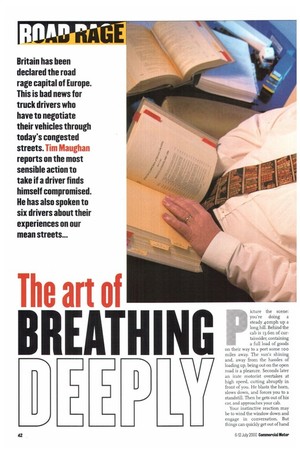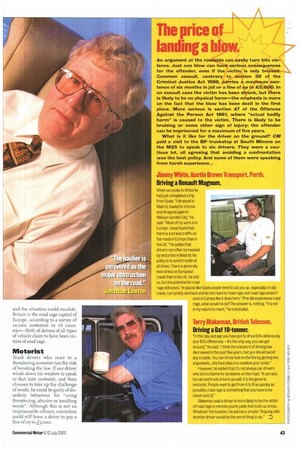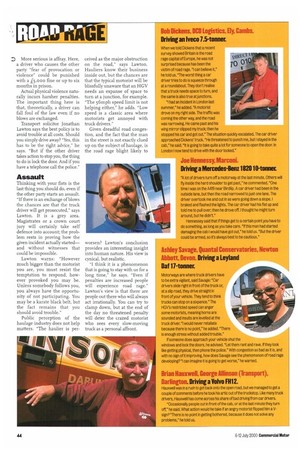The art of BEAT
Page 44

Page 45

Page 46

If you've noticed an error in this article please click here to report it so we can fix it.
icture the scene: you're doing a steady 4omph up a long hill. Behind the cab is 13.6m of curtainsider, containing a full load of goods on their way to a port some roc, miles away. The sun's shining and, away from the hassles of loading up, being out on the open road is a pleasure. Seconds later an irate motorist overtakes at high speed, cutting abruptly in front of you. He blasts the horn, slows down, and forces you to a standstill. Then he gets out of his car, and approaches your cab.
Your instinctive reaction may be to wind the window down and engage in conversation. But things can quickly get out of hand
and the situation could escalate. Britain is the road rage capital of Europe, according to a survey of io,000 motorists in 16 countries-8o% of drivers of all types of vehicle claim to have been victims of road rage.
Motorist Truck drivers who react to a threatening motorist run the risk of breaking the law. If our driver winds down his window to speak to that irate motorist, and then chooses to take up the challenge of words, he could be guilty of disorderly behaviour for "using threatening, abusive or insulting words". Although this is not an imprisonable offence, conviction could still leave a driver to pay a fine of up toI5,000.
n More serious is affray. Here, a driver who causes the other party "fear of provocation or violence" could be punished with a is, ocio fine or up to six months in prison.
Actual physical violence naturally incurs harsher penalties. The important thing here is that, theoretically, a driver can fall foul of the law even if no blows are exchanged.
Transport solicitor Jonathan Lawton says the best policy is to avoid trouble at all costs. Should you simply drive away? "Yes, this has to be the right advice," he says. "But if the other driver takes action to stop you, the thing to do is lock the door. And if you have a telephone call the police."
Assault
Thinking with your fists is the last thing you should do, even if the other party starts an assault. "If there is an exchange of blows the chances are that the truck driver will get prosecuted," says Lawton. It is a grey area. Magistrates or a crown court jury will certainly take self defence into account; the problem rests in proving how the given incident actually started— and without witnesses that could be impossible.
Lawton warns: "However much bigger than the motorist you are, you must resist the temptation to respond, however provoked you may be. Unless somebody follows you, you always have the opportunity of not participating. You may be a karate black belt, but the fact remains that you should avoid trouble."
Public perception of the haulage industry does not help matters. "The haulier is per
ceived as the major obstruction on the road," says Lawton. Hauliers know their business inside out, but the chances are that the typical motorist will be blissfully unaware that an HGV needs an expanse of space to turn at a junction, for example. "The 56.mph speed limit is not helping either," he adds. "Low speed is a classic area where motorists get annoyed with truck drivers."
Given dreadful road congestion, and the fact that the man in the street is not exactly clued up on the subject of haulage, is the road rage blight likely to worsen? Lawton's conclusion provides an interesting insight into human nature. His view is cynical, but realistic.
"I think it is a phenomenon that is going to stay with us for a long time," he says. "Even if penalties are increased people will experience road rage." Lawton's view is that there are people out there who will always act irrationally. You can try to clamp down, but at the end of the day no threatened penalty will deter the crazed motorist who sees every slow-moving truck as a personal affront.




















































































































